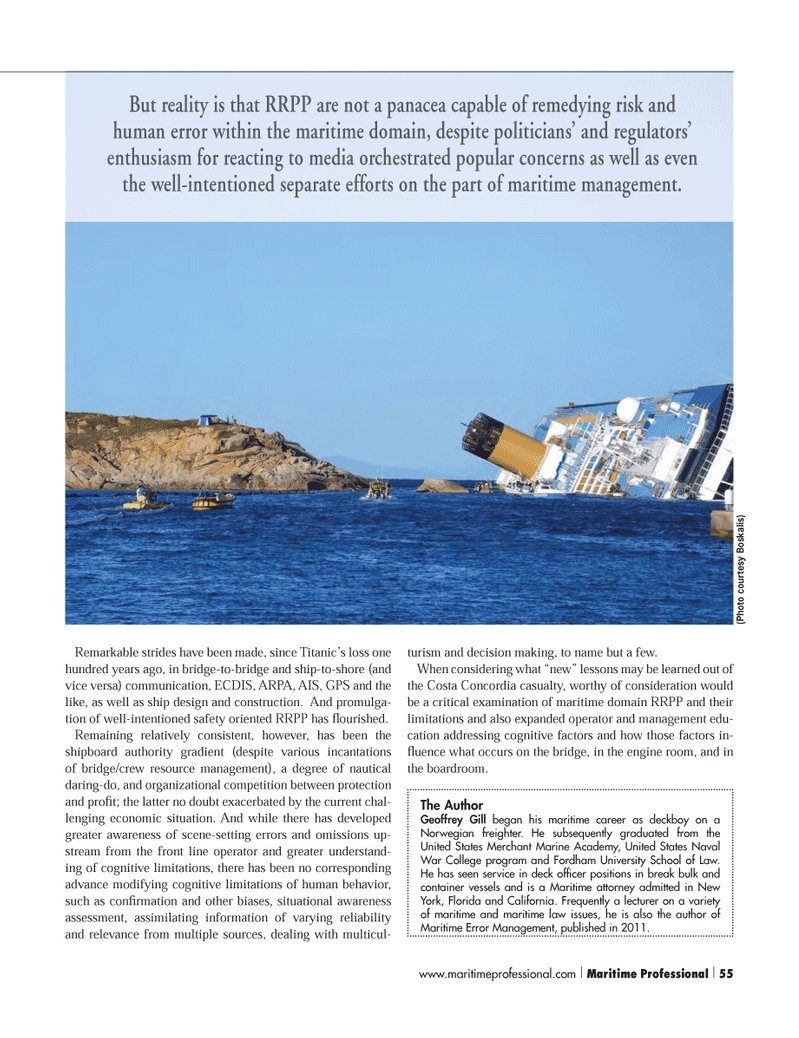
Page 55: of Maritime Logistics Professional Magazine (Q1 2013)
Maritime Risk
Read this page in Pdf, Flash or Html5 edition of Q1 2013 Maritime Logistics Professional Magazine
Remarkable strides have been made, since Titanic?s loss one hundred years ago, in bridge-to-bridge and ship-to-shore (and vice versa) communication, ECDIS, ARPA, AIS, GPS and the like, as well as ship design and construction. And promulga- tion of well-intentioned safety oriented RRPP has ourished.Remaining relatively consistent, however, has been the shipboard authority gradient (despite various incantations of bridge/crew resource management), a degree of nautical daring-do, and organizational competition between protection and pro t; the latter no doubt exacerbated by the current chal- lenging economic situation. And while there has developed greater awareness of scene-setting errors and omissions up- stream from the front line operator and greater understand-ing of cognitive limitations, there has been no corresponding advance modifying cognitive limitations of human behavior, such as con rmation and other biases, situational awareness assessment, assimilating information of varying reliability and relevance from multiple sources, dealing with multicul- turism and decision making, to name but a few. When considering what ?new? lessons may be learned out of the Costa Concordia casualty, worthy of consideration would be a critical examination of maritime domain RRPP and their limitations and also expanded operator and management edu- cation addressing cognitive factors and how those factors in- uence what occurs on the bridge, in the engine room, and in the boardroom.BBut reality is that RRPP are n ot a panacea capable off remmeeddyyiinngg rriisk and human error within the maritime domain, despite politicians? andd rreegguullaattoors? enthusiasm for reactin g to media orc hestrated popular concerns as wellll aass eevveenn the well-intentioned separate efforts on the part of marit ime managementt.(Photo courtesy Boskalis) The Author Geoffrey Gill began his maritime career as deckboy on a Norwegian freighter. He subsequently graduated from the United States Merchant Marine Academy, United States Naval War College program and Fordham University School of Law. He has seen service in deck ofÞ cer positions in break bulk and container vessels and is a Maritime attorney admitted in New York, Florida and California. Frequently a lecturer on a variety of maritime and maritime law issues, he is also the author of Maritime Error Management, published in 2011.www.maritimeprofessional.com | Maritime Professional | 55MP #4 50-63.indd 55MP #4 50-63.indd 552/25/2013 10:32:23 AM2/25/2013 10:32:23 AM

 54
54

 56
56
